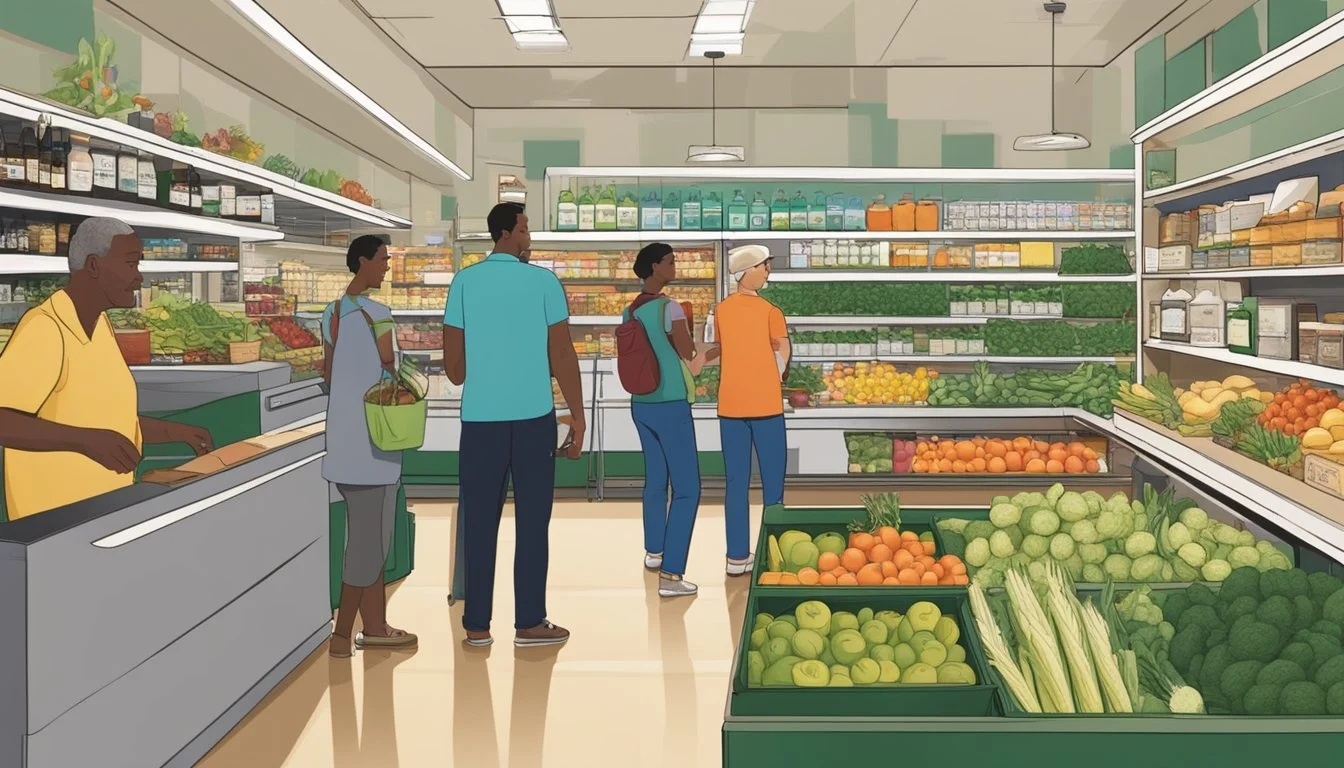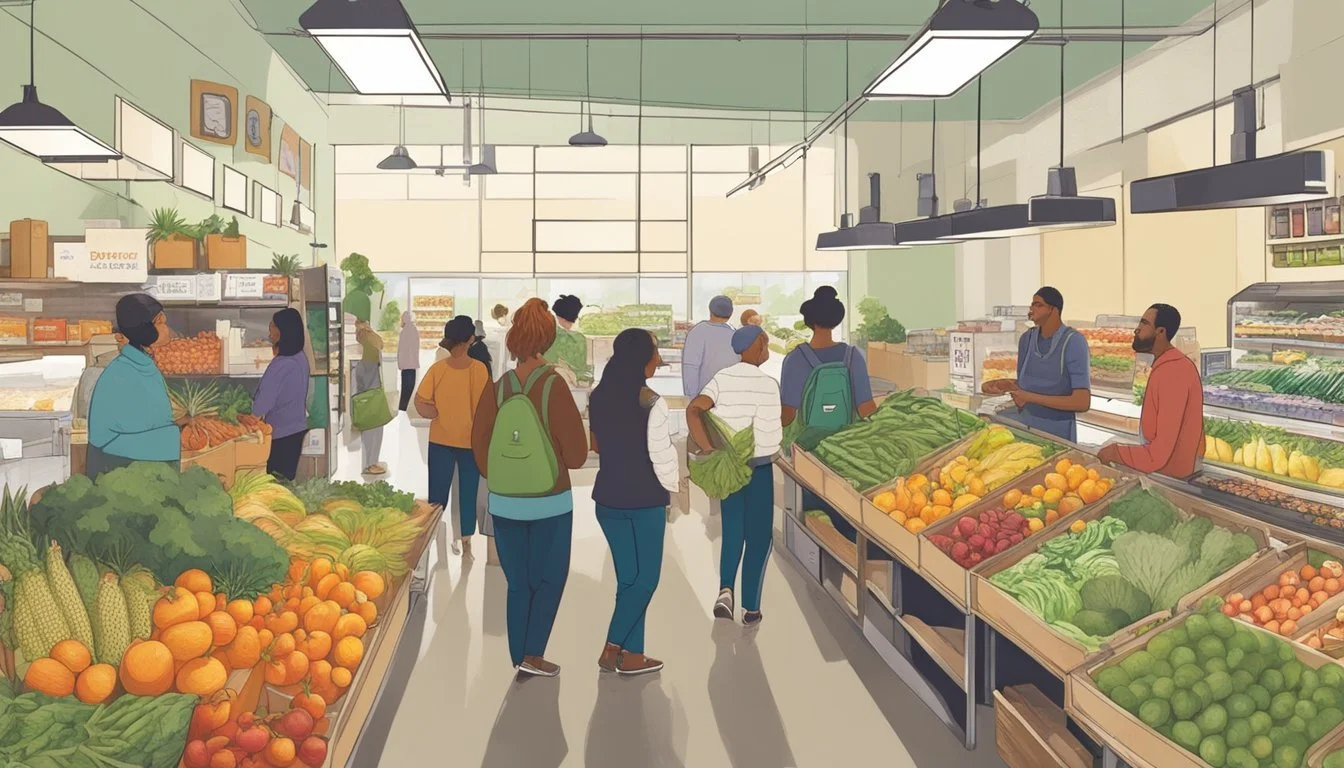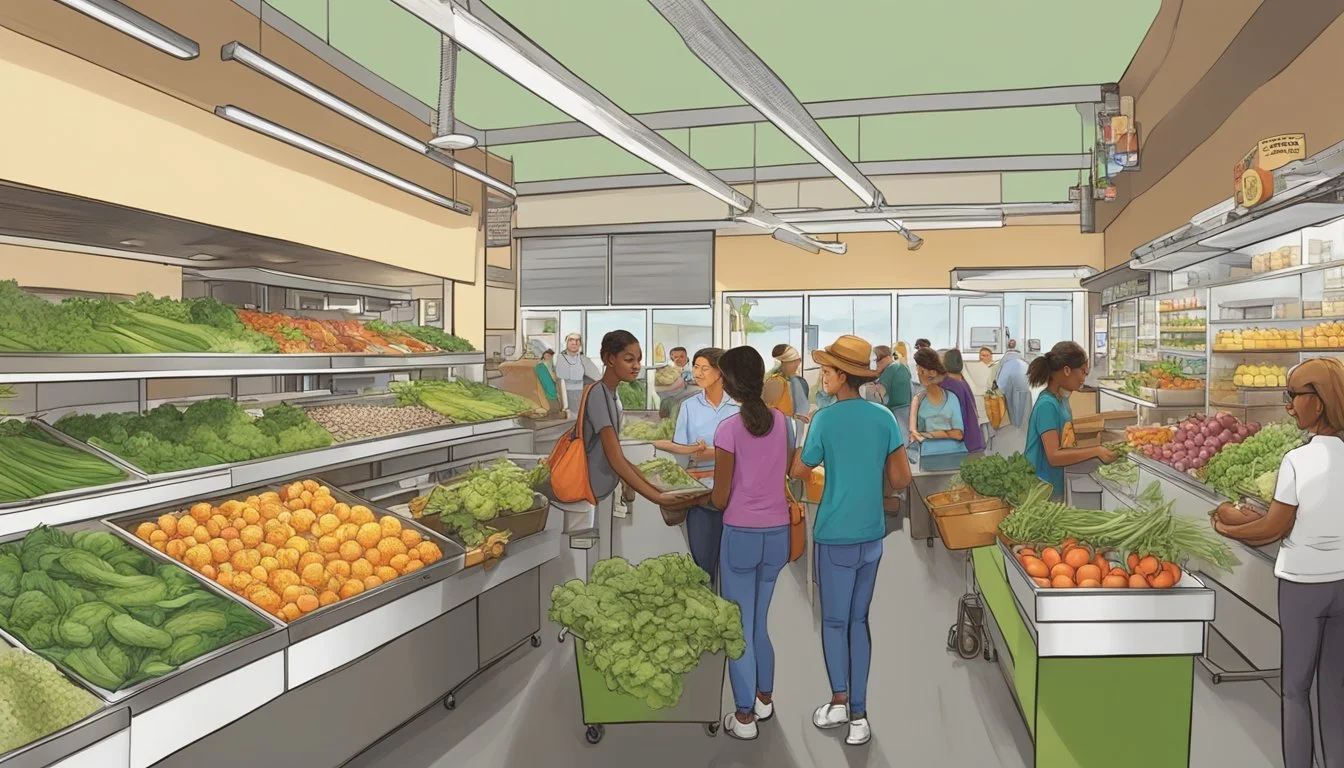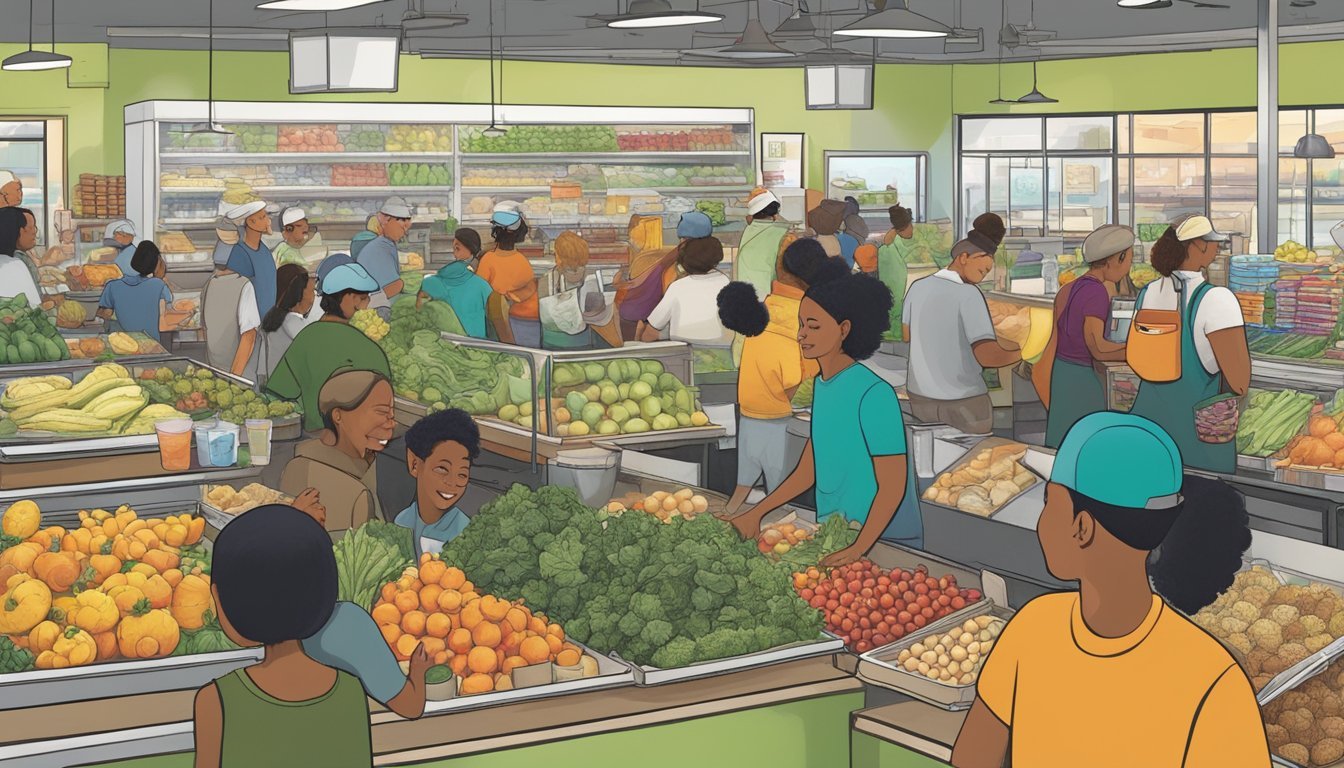Guide to Food Co-Ops in San Diego, CA
Navigating Local Collective Markets
San Diego, known for its beautiful coastline and vibrant culture, is also home to a variety of food co-operatives, or food co-ops, which have become integral to the local community. Food co-ops are member-owned marketplaces that prioritize selling organic and locally sourced goods, promoting not just healthy eating but also sustainable and ethical shopping practices. They offer a unique alternative to traditional supermarkets by focusing on community involvement and providing a platform for local producers to reach consumers directly.
In San Diego, food co-ops are more than just grocery stores; they are social enterprises that embody the spirit of collaboration and mutual aid. These establishments typically operate on a membership basis, but they are open to all, ensuring that the entire community has access to high-quality, nutritious food. The Ocean Beach People's Food Co-op, established in 1971, is a prominent example; it's known for being completely vegetarian with a 100% vegan deli and bakery, distinguishing itself as a leader in health-conscious and environmentally friendly retail.
The presence of food co-ops in San Diego is a testament to the city's commitment to health, wellness, and community engagement. They are not merely stores but also educational centers where individuals can learn about nutrition, sustainability, and the benefits of supporting local agriculture. With a variety of organic, non-GMO, and cruelty-free products, these co-ops are tailored to the evolving needs of San Diego's diverse population, serving as a cornerstone for a healthier and more communal lifestyle.
What Is a Food Co-Op?
A food co-op, short for cooperative, stands as a unique form of business owned and operated by the members of the community it serves. These establishments are chiefly distinct from conventional grocery stores due to their community-owned structure. Rather than being answerable to external shareholders, a co-op is accountable to its member-owners who have a stake in the operations and benefits of the entity.
Membership in a food co-op typically involves a financial investment into the cooperative. The members wield democratic control, usually through a one-member-one-vote system, regardless of the amount invested. This fosters equitable decision-making and ensures that each member-owner has a voice in key decisions, from product sourcing to business practices.
Food co-ops are known for prioritizing the provision of high-quality, often organic, and locally sourced food options. They are committed to:
Sustainability: Advocating for environmentally responsible products.
Education: Informing the community about health, nutrition, and the food system.
Local economy: Supporting local farmers and producers thereby reinforcing the local economy.
The idea of a food co-op is more than simply a place to purchase groceries; it's an initiative to create a supportive network within the community, enhancing the overall well-being of its members and the local economy. San Diego houses such co-ops, with OB People's Food Co-op being a notable example, illustrating the enduring appeal and relevance of food cooperatives in contemporary society.
Benefits of Shopping at Food Co-Ops
Food co-ops in San Diego offer a unique shopping experience with distinct advantages in terms of produce quality and community impact. Shoppers can expect a variety of locally sourced, sustainable options that support the regional economy and contribute to a strong community fabric.
Supporting Local Economy
Food co-ops are pivotal in enhancing the local economy. By purchasing shares, individuals become member-owners and play a direct role in the economic vitality of the San Diego area. They help keep money circulating locally by:
Supporting local farmers and producers, ensuring that profits stay within the community.
Encouraging the growth of local businesses that supply a range of specialty produce and artisanal goods.
Fresh and Organic Options
Shoppers at food co-ops enjoy access to fresh and often organic produce that is sourced with sustainability in mind. These co-ops make it a priority to offer:
Seasonal produce that is often picked at peak freshness and available shortly thereafter, reducing travel time and preserving nutritional quality.
A selection of organic items that avoid the use of synthetic pesticides and fertilizers, promoting sustainable farming practices.
Community Benefits
Food co-ops are more than just grocery stores; they are hubs for community engagement. They provide:
An outlet for San Diegans to come together, celebrate food diversity, and discuss community issues.
Volunteering opportunities that offer valuable work experience and skill development.
Events and workshops that foster a sense of community spirit and connectedness.
Shoppers at San Diego food co-ops not only receive the benefit of high-quality groceries but also contribute to a thriving local ecosystem and a healthier, more connected community.
How to Become a Member
Becoming a member of a food co-op in San Diego allows individuals to partake in a community-owned shopping experience, offering various member incentives and contributing to the local economy.
Membership Process
To become a member of a food co-op such as the OB People's Food Co-op in San Diego, interested parties must complete an investment, which typically is a modest annual fee. For instance, the co-op requires an initial investment to grant ownership status.
Initial Investment: The OB People's Co-op requires a $15 annual fee to become an owner.
Application: Prospective members must fill out an application, either in-store or online, providing necessary contact information.
Payment: The annual fee can typically be paid at the store or through an online portal.
Member Incentives
As part of a member-owned grocery entity, members enjoy various incentives that enhance their shopping experience and contribute to communal well-being.
Discounts: Members may receive discounts on products and special deals throughout the year.
Community Impact: Membership ensures that service and profits stay local, fostering economic growth within the community.
Ownership Benefits: Members often have a say in the operations of the co-op and gain access to special events or programs. Additionally, a unique program like the FLOWER offers reduced equity investments for those who qualify, representing the co-op's commitment to inclusivity and community service.
Exploring the Best Food Co-Ops in San Diego
San Diego is home to a variety of food co-ops, with each providing the community access to fresh, organic, and locally-sourced products. These co-ops not only offer an alternative to traditional grocery shopping but also support a sustainable food system.
Ocean Beach People's Organic Food Market
Location
4765 Voltaire Street, San Diego, CA 92107
Highlights
Years in Business: Over 50 years
Rating: 4.4 stars from over 550 reviews
Services: Outdoor seating, Delivery, Curbside Pickup
Specialty: Health Markets, Organic Stores, Vegan Options
Community Focus: Vegetarian-friendly, local products
The Ocean Beach People's Organic Food Market, commonly known as People's, stands out as the cornerstone of the Ocean Beach community. Operating for more than half a century, People's has earned a reputation for its commitment to organic produce, vegan choices, and health-focused products. With a strong ethos of community ownership, this co-op goes beyond just selling food; it is an institution promoting environmental responsibility and community engagement.
Other Notable Co-Ops in the Area
Several other food co-ops in San Diego are noteworthy for their unique contributions to local food culture and community service:
North Park Produce
Rating: 3.7 stars out of 288 reviews
Category: Grocery
Noted for its variety of fresh produce and international food items.
Golden Hills Co-Op
Joining Information: Open to new members on Saturdays from 11:00 a.m. to 1:00 p.m. at 2963 Beech Street.
These co-ops, while diverse in their offerings, share a common goal of nurturing a community-oriented food system where the quality and source of food are as important as the nourishment it provides.
Products and Services Offered
Food Co-ops in San Diego offer a range of products and services catering to health-conscious consumers and those seeking organic and sustainable food options. These co-ops prioritize community well-being, environmental sustainability, and provide alternative and wholesome choices for daily eating.
Bulk Goods and Groceries
Most San Diego co-ops have bulk goods sections with a variety of non-GMO, organic, and locally sourced items. These typically include:
Grains and cereals
Nuts and seeds
Spices and herbs
Beans and lentils
Organic produce
Bulk sections help reduce packaging waste and allow consumers to purchase the exact amounts needed, promoting sustainability and potentially reducing food waste.
Delis and Hot Food Options
Many co-ops boast delis that offer made-to-order sandwiches, alongside hot bar and salad case options that frequently rotate. Their offerings often highlight:
Vegan and vegetarian dishes (What wine goes well with vegetarian dishes?)
Freshly-baked vegan bakery items
Organic salad bars
These delis focus on providing healthy foods without sacrificing flavor, often featuring ingredients that are organic and cruelty-free.
Wellness and Sustainable Products
The wellness section in these food co-ops is dedicated to products that support a healthy lifestyle and are environmentally sustainable. Shoppers can typically find:
Cruelty-free personal care items
Supplements and vitamins
Eco-friendly cleaning products
Food co-ops in San Diego are committed to adapting to their customers' changing needs while ensuring the availability of fundamental sustainable and healthy products.
Special Features of San Diego Food Co-Ops
San Diego’s food cooperatives are known for their focus on healthy eating options and community wellness. These co-ops often feature unique offerings that cater to a variety of dietary preferences and health-conscious individuals.
Organic Salad Bars
Most food co-ops in San Diego boast organic salad bars, which serve a selection of fresh, organic ingredients. These establishments prioritize healthful, vegetarian options, ensuring that salads are not only nutritious but also cater to a wide range of dietary needs. Customers can typically customize their salads with a variety of organic greens, vegetables, beans, and wholesome dressings to create a meal that is both satisfying and aligned with their well-being.
Specialty Health Items
Within the aisles of San Diego's food co-ops, shoppers will find an array of specialty health items. This includes a diverse selection of natural vitamins and supplements aimed at supporting overall well-being. Moreover, these co-ops often carry a selection of sandwiches made with organic ingredients for those seeking a quick yet healthy meal option. Dedicated to natural living, these co-ops serve as a one-stop-shop for individuals looking to maintain a healthy, balanced diet.
Community Involvement and Education
In San Diego, food co-ops play an active role in fostering a connected and informed community. These co-operatives facilitate educational initiatives and offer opportunities for community members to engage directly with sustainable food practices.
Events and Workshops
Food cooperatives in San Diego host a range of events and workshops that aim to educate individuals about sustainable food systems. They cover topics from organic farming practices to nutrition and healthy eating. SunCoast Market Co-op, for instance, organizes events that support learning and community engagement. The OB People's Food Co-op often features workshops for members and non-members alike, ensuring that everyone has the chance to gain valuable knowledge and skills related to food and sustainability.
Volunteer Opportunities
Volunteer opportunities are abundant within San Diego's food co-ops. These organizations rely on volunteers to assist in various functions, from daily operations to community events. Volunteering is not only a way for individuals to contribute to their local community, but it also serves as an educational tool, allowing participants to gain hands-on experience in co-operative business models and sustainable food systems. Volunteers are a vital part of the workforce that educates and empowers the community through these local, member-owned grocery stores.
Customer Experiences and Reviews
San Diego's food co-ops are known for their dedication to providing high-quality, healthy, organic options. Customers often share their experiences through reviews and testimonials, which spotlight the co-ops' reputations in the community.
Testimonials
Customers at North Park Produce have consistently noted the quality of the fruits and vegetables, even mentioning that they have been loyal shoppers for years. The reviews emphasize the importance of having a local spot that offers fresh produce alongside other grocery essentials. Patrons have also pointed out the convenience of services such as curbside pickup, which speaks volumes about the store's commitment to customer satisfaction.
Windmill Farms receives praise for its offering of organic products, with reviewers giving it an impressive 4.2 rating. This co-op seems to have made a positive impact by catering to the health-conscious consumer.
Member Stories
Ocean Beach People's Organic Food Market stands out with its history dating back to 1972. It started as a worker's collective and now boasts over 13,500 member/owners. Members typically highlight the community feel of the co-op and how it has become a staple in their daily lives by offering a vast selection of organic produce and wellness products.
Members and shoppers at these co-ops frequently commend the staff for being helpful and knowledgeable. They often feel that their shopping experience is elevated due to the staff's assistance and the overall positive environment of the stores.
Tips for Shopping at Food Co-Ops
Shopping at food cooperatives in San Diego can be a rewarding experience for those interested in healthy meals and value for money. Co-ops often offer competitive prices along with a sense of community involvement.
Finding the Best Deals
Member Benefits: Most co-ops offer membership options that provide significant savings. For example, a one-time membership fee may yield ongoing discounts on purchases. Additionally, periodic benefits such as 10% off shopping events can lead to considerable discounts on grocery totals.
Seasonal Produce: Customers should look for seasonal produce as it is often priced lower than out-of-season counterparts.
Bulk Buying: Bulk sections in co-ops are great for saving money, as they typically have lower prices per unit and allow customers to purchase exactly the quantity they need.
Navigating the Store Efficiently
Store Layout: Familiarizing oneself with the store's layout can save time. Typically, fresh produce and bakery items are located around the perimeter, while packaged goods and bulk items are arranged in the center aisles.
Product Labels: Look for labels and signs that highlight discounts or special deals exclusive to members.
Prepared Foods: For those seeking a healthy meal without the prep time, many co-ops have a section with ready-to-eat options. These can offer wholesome alternatives to traditional fast food.
By keeping these tips in mind, shoppers can make the most out of their visit to a food co-op, striking a balance between healthy eating and budget-friendly shopping.
Sustainability and Environmental Impact
Food co-ops in San Diego have embraced sustainability as a core principle in their operations. By prioritizing local sourcing, these co-ops are able to reduce carbon emissions associated with long-distance transportation. By supporting local farmers and producers, they ensure that money stays within the community, fostering local economic growth.
Sourcing Practices:
Local: Co-ops strive to source products from local suppliers, minimizing food miles and promoting regional agriculture.
Non-GMO: Many co-ops opt for non-GMO foods, catering to consumers seeking natural food options.
Cruelty-Free: Animal welfare is a consideration with cruelty-free products often being part of the inventory.
By implementing sustainable practices, co-ops contribute to the development of a more resilient food system. For instance, OB People's Food Co-op is a community-owned initiative in San Diego that reflects these values.
Environmental Regeneration: Co-ops work collectively to foster an environmentally regenerative approach to food production and distribution.
The co-op model strengthens community bonds while focusing on sustainable, environmentally friendly methods of food supply. This model has the dual benefit of promoting environmental stewardship and providing a platform for community members to impact their local food systems directly.
Waste Reduction: Efforts are made to manage food waste responsibly through various means such as donation, upcycling, or composting.
Food co-ops in San Diego thus serve as a model for sustainable business practices that can positively affect the environment, promote sustainability, and inspire other communities and businesses to adopt similar practices.
Employment and Co-Op Governance
In a community-owned food co-op like those found in San Diego, employees and governance play a vital role in maintaining the integrity and operation of the coop. Governance models such as Policy Governance are often adopted, focusing on clarity, accountability, and strategic leadership.
Working at a Co-Op
Employees at food co-ops are integral to daily operations and often share in the co-op's values and mission. Co-op employees can expect:
Engagement with community: Working at a co-op involves a close relationship with the local community, contributing to a unique workplace culture.
Diverse roles: Positions range from store management to food preparation, each contributing to the co-op's success.
Board of Directors and Meetings
The Board of Directors is a critical governance structure for a community-owned co-op. It usually consists of:
Elected members: The board is commonly elected by the co-op's members**,** representing its democratic nature.
Regular meetings: Meetings are held to ensure strategic decisions align with the co-op's mission.
Board Responsibilities:
Setting broad policies
Ensuring the co-op's financial well-being
Engaging with co-op members
These aspects of employment and governance contribute to the success and sustainability of food co-ops in San Diego.












